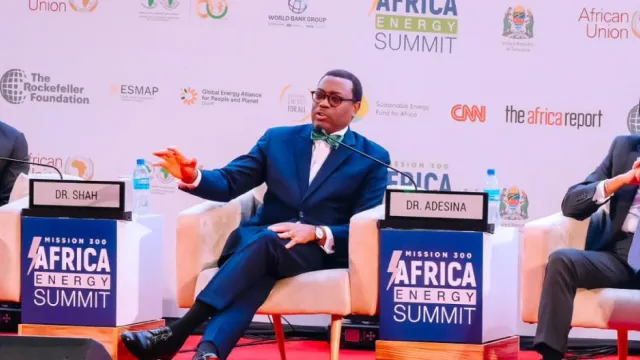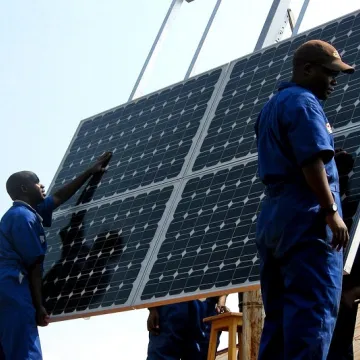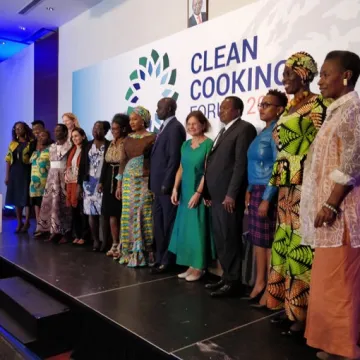Mission 300: A bold push to end energy poverty in Africa

AfDB President Dr. Akinwumi Adesina speaking at the ongoing Mission 300 Africa Energy Summit in Dar es Salaam. Mission 300 is an ambitious plan that seeks to connect 300 million people in Africa to electricity by 2030.
In Tanzania, an ambitious plan to end energy poverty in Africa is underway. Dozens of Heads of State and hundreds of leaders from key policy organs are meeting to offer both financial and policy support to a continental plan to connect 300 people to electricity across Africa by 2030.
The plan, which is dubbed Mission 300 has received the backing of the World Bank Group, the African Development Bank (AfDB), and an alliance of other partners such as The Rockefeller Foundation.
Together with the AfDB, the World Bank has announced a plan to provide $30 billion in funding from the International Development Association (IDA), its low-income country arm, to de-risk private investments and attract $90 billion worth of financing for electrification, focusing on grid extensions and off-grid solar systems.
On the first day of the Africa Energy Summit in Dar es Salaam, participants heard that Mission 300 seeks to tap innovative ways to plug Africa's electricity access gap using new technology and fresh financing models.
“This is mission critical… Our mission here is to say we need everybody… It’s not about us, it’s about those who are not here, and we must listen and hear and make sure this is an action-driven summit… We can’t do Mickey Mouse business... We can’t have a situation where Africa does not have enough electricity,” the AfDB President Dr. Akinwumi Adesina told the delegates.
According to the organisers, the summit is expected to yield two outcomes: Dar es Salaam Energy Declaration, which is a deal that outlining commitments and practical actions from African governments to reform the energy sector, and the first set of National Energy Compacts, which will serve as blueprints with country-specific targets and timelines for implementation of critical reforms.
The January 27-28, 2025, summit has attracted thousands high profile delegates including presidents, several African energy ministers, global development partners, private sector players, civil society organizations, and foundations.
At the moment, over 600 million people in Africa lack access to electricity, which is a critical enabler of economic development and job creation. According to Kenya's Ministry of Energy, a total of 774,000 new electricity consumers were added to the national grid between 2022 and 2024 even as the country's energy generation went up by over 240MW or 5.4 percent to 3243MW last year. The country has roughly 9.7 million homes with access to power. In 2022, data from the World Bank shows about 24 percent of Kenya's population lacks access to electricity supply.
Dr. Adesina called for regulatory reforms and private sector engagement to achieve this ambitious goal. He said there is need for active involvement from stakeholders both bilateral and multilateral institutions, private sector entities, civil society organizations, and foundations.
The second day of the summit will see the participation of several heads of state from across Africa. President William Ruto departed Nairobi for the summit on Tuesday where he will join more than 1,500 other participants to chart Africa’s course toward universal access to energy.
“We have a clear path to reaching these 300 million people,” Dr. Adesina noted. “With power, Africa will not just meet expectations but exceed them, becoming a competitive and prosperous continent,” he added.
Mission 300 seeks to incorporate accountability measures, including country-specific monitoring and evaluation systems and the Africa Energy Regulatory Index to track progress.
“This is all about accountability, transparency, and delivery while letting Africa develop with pride,” Dr. Adesina stated.
AfDB President highlighted the devastating toll of traditional cooking methods based on firewood and charcoal, resulting in the loss of about 600,000 lives of women and children annually due to smoke exposure.
The crisis extends beyond energy access, affecting environmental sustainability through deforestation and biodiversity loss. “It’s not just about energy transition,” Dr. Adesina said.
“This is about dignity. Africa must develop with dignity and pride, and access to clean cooking solutions is fundamental to achieving this goal.” He lauded Tanzania for developing a comprehensive national strategy to address this issue.
World Bank Group President Ajay Banga expressed optimism about the initiative, saying its ambitious objectives are achievable through hard work, particularly in ensuring a conducive environment for the private sector to participate.
Banga noted that there is need for predictability of currencies, regulatory frameworks and land acquisition to incentivize investments supporting Mission 300.
In his remarks, Rajiv Shah, President of The Rockefeller Foundation, asked philanthropists across the world back the initiative.
“Please join us in getting behind the ideas of this initiative and the country compacts that the leaders will be signing. What is at stake is the future of African economies, the future of African young people, and the future of our world,” he said, adding that his foundation was committing $65 million to the program.





